Friday, January 19, 2007
Early Chicago House

Early Chicago House Music
The Neo-Liberal idea that free market competition will result in positive gains for the consumer might be true in the case of early House Music. In the early 80's, two DJ's at two clubs had a healthy rivalry to attract and please the large and discriminating Club Scene.
The Music Industry and Pop Culture had proclaime "Disco Sucks!" and had decided disco was dead. But there were plenty of folks who still wanted to get high and dance to an up-tempo funky groove. Frankie Knuckles at The Warehouse and Ron Hardy at the Music Box were two DJ's willing to give the clubbers what they wanted.
The Music Industry did mostly control what kind of records were made, though. No longer were large recording sessions with skilled musicians, orchestras, and arrangers funded. Besides Italo Disco and New York Garage (Classic Garage), there weren't many disco records being made. But the clubbers had an appetite for new grooves that the DJ's had to feed.
Knuckles and Hardy would loop classic grooves on a reel to reel and synch it to a disco beat programed into the 808 and 909 drum machines from Roland's TR series. This beat became known as a "House Beat" and the music came to be called "House Music." Most say it's called House because it was the stuff Frankie Knuckles played at the club "The Warehouse." But The Music Box's Ron Hardy was just as influential in the creation of this new club sound.

Producers soon re-created the "House Sound" in the studio and Chicago's Trax Records became the first label to put out House Records. Now days, not only are there countless House DJ's, Producers, and Labels, but many various styles of House Music.

Ron Hardy Mixes
Here's a mixtape full of bootleg recordings of Ron Hardy spinning at The Music Box
1. Live at The Muzic Box, Chicago 4/3/1983
2. Live at The Muzic Box, Chicago 12/15/1983
3. Live at The Muzic Box, Chicago 6/19/1984
4. Live at The Muzic Box, Chicago 1986
5. Live at The Muzic Box, Chicago 198?

Frankie Knuckles Mixes
Here's a mixtape of Frankie Knuckle's spinning on the classic Chicago radio station WBMX
1. (w/ Mickey Oliver) 102.7 FM WBMX Friday Night Jams 1985
2. Friday Night Jams on 102.7 FM WBMX 10/31/1986
3. (w/ Frankie Hollywood Rodriquez) 102.7 FM WBMX 1986?
4. 102.7 FM WBMX 1987
5. Friday Night Jams, 102.7 FM WBMX 198?

History of House Music Links:
House Music (Wiki)
History of House (Ele-Mental)
History of House (HyperReal)
History of House (Pulsation)
History of House (TruGroovez)
History of House (Rodney Bakerr)
Chicago House (Hanst-Manchester)
DJ History
Tuesday, January 16, 2007
Larry Levan

Track List:
1978 – Cookie Monster & the Girls - C Is For Cookie
1978 – Instant Funk – I Got My Mind Made Up
1978 – Loose Joints – Is It All Over My Face? (Female Vocal)
1978 – Bumblebee Unlimited - Lady Bug
1979 – Dee Dee Bridgewater - Bad For Me
1979 – Instant Funk - Bodyshine
1979 – First Choice - Double Cross
1979 – Skyy - First Time Around
1979 – Billy Nichols - Give Your Body Up to the Music
1979 – Sparkle - Handsome Man
1979 – Loleatta Holloway - The Greatest Performance Of My Life
1979 – Taana Gardner - When You Touch Me
1980 – Cognac - How High
1980 – Janice McClain - Smack Dab In the Middle
1980 – Taana Gardner - Work That Body
1981 – Inner Life - Ain’t No Mountain High Enough
1981 – Taana Gardner - Heartbeat
1981 – Logg - I Know You Will
1981 – Ednah Holt - Serious, Sirious Space Party
1981 – Sparque - Let’s Go Dancin’
1981 – Central Line - Walking Into Sunshine
1982 – Lace - Can’t Play Around
1982 - New York Citi Peech Boys - Don’t Make Me Wait (instrumental)
1982 – Gwen Guthrie - It Should Have Been You
1982 – Tracy Weber - Sure Shot
1982 – Chaka Khan - Tearin’ It Up
1983 – Jeffrey Osborne - Plane Love
1983 – David Joseph - You Can’t Hide Your Love
1986 – Gwen Guthrie - Ain’t Nothin’ Goin’ On But the Rent
1986 – Mann Friday – Love Honey, Love Heartache
1989 – Shimada Nami - Sun Shower
***NOTE: I intend to update this page with more song descriptions and more songs (including "Every Way But Loose" by Plunky & the Oneness of Juju (1982) and "Padlock" by Gwen Guthrie - featuring Sly & Robbie (1985). Unfortunately, I have several of my favorites on vinyl only and can't convert them to mp3's at this time. I also intend to feature tracks "popular @ the Paradise Garage" on a future MyPod.***
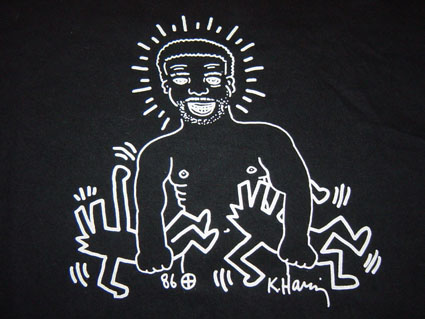
Larry Levan (1954-1992) is one of the most important figures in the history of Club Music. He almost single handedly kept the scene alive during the period after Disco "died" and House Music was "born." Both his DJing at the Paradise Garage and his remix & production work were so influential during the early 80's, Club music from this period came to be called "Garage."
Larry Levan is famous for his high energy DJ sets which would transport the dancer to another place and time. He wasn't a techhnical DJ like today's beat matchers, but played the right record at the right time, creating a "journy" or a "trip"with his sets. He would often use two copies of the same record so he could extend instrumentals over and over or remix the track live. He would play the acapella over the instrumental so he could drop out the beats or tweak the vocals independently.
He remix and production work was influential for combining funky soul & gospel with synthesizers and dub elements. He would strip tracks down to just the beat and then would slowly build the track back up, one instrument or groove at a time.
There are many links provided below where you can read more about Larry. There are several YouTube videos you can watch here. Most of them are from the excellent documentary "Maestro."
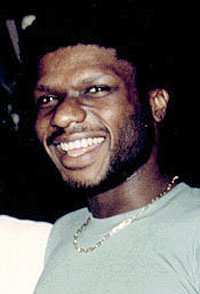
Here are some good Larry Levan & Paradise Garage Links:
TheParadiseGarage.net
Disco-Disco
JahSonic
West End Records
Discogs (includes Discography)
Disco Museum
Wikipedia
Kevin Lewis Article
Paradise Garage Remembrances
Tina Paul Tribute
aGarageTribute.com
AndWeDanced.com
GlobalDarkness.com
Answers.com

*****BONUS!!!*****
Here is a bootleg of Larry Levan mixing live.
1. Live @ Paradise Garage 1985
2. Live @ Endmax, Japan 1991
3. Birthday Bash@Gold, Tokyo 1992
For more Larry Levan DJ mixes (mostly in RealPlayer)and tons more classic mixes from old school (and nu school) DJs check this out!

Tuesday, January 09, 2007
Fela Kuti

I only recently discovered Fela Kuti when listening to BBC Radio late at night. Brian Eno was raving about Tony Allen, and his drumming in Fela Kuti’s band Africa 70.
You can hear the BBC segment here
I have a lot of respect for Brian Eno’s knowledge and musicianship so I took notice and checked out some CD’s from the library the very next day. And then I listened to nothing but Fela Kuti and Tony Allen for weeks.
With all that Afrobeat in my head, I started wondering what it would sound like if I tried making Afrobeat music. At first I had to laugh, picturing me and my white buddies jamming some of that funky African stuff. But when I really imagined in my head what it would sound like if white people did Afrobeat, it came out sounding like the Talking Heads. Suddenly I thought of Brian Eno (who produced several Talking Heads albums) and it all made sense. Sure enough, I found out that Eno turned the Talking Heads on to Fela Kuti, who became a major influence for early 80’s Talking Heads. You can listen to Eno talk about it here, in an NPR segment on “Once In a Lifetime.” It was a song pick for their series NPR 100.
I have a lot to say about Fela Kuti’s music but, right now, I don’t even know where to start He’s funky and he jams! I’ll try to edit this when I call articulate better.

Fela Anikulapo Kuti, born in Abeokuta, Nigeria in 1938, was a singer-composer, trumpet, sax and keyboard player, bandleader, and politician. Kuti was one of Africa's most controversial musicians and throughout his life he continued to fight for the rights of the common man (and woman) despite vilification, harassment, and even imprisonment by the government of Nigeria.
His bands traditionally included the typical huge line-up consisting of many singers and dancers, numerous saxophonists, trumpeteers, drummers, percussionists, and of course, many guitarists blending African rhythms and jazz horn lines with politicized song lyrics. His music was intricate, rather than calling it Afro-beat you might more arguably consider it Afro-jazz. Entire recordings often consisted of just a few songs and this propensity for jamming set up a roadblock for Fela to attain commercial acceptance in the United States. He also abhored performing a song after recording it, and this led to audience disinterest in the U.S. where the people wanted their music to be recognizable hits. – African Music Encyclopedia

In 1969, Fela brought Koola Lobitos to Los Angeles to tour and record. They toured America for about eight months using Los Angeles as a home base. It was while in L.A. that Fela hooked up with a friend, Sandra Isidore, who introduced him to the writings and politics of Malcolm X, Eldridge Cleaver (and by extension the Black Panthers), and other proponents of Black nationalism and Afrocentrism. Impressed at what he read, Fela was politically revivified and decided that some changes were in order: first, the name of the band, as Koola Lobitos became Nigeria 70; second, the music would become more politically explicit and critical of the oppression of the powerless worldwide. After a disagreement with an unscrupulous promoter who turned them in to the Immigration and Naturalization Services, Fela and band were charged with working without work permits. Realizing that time was short before they were sent back to Nigeria, they were able to scrape together some money to record some new songs in L.A. What came to be known as the '69 Los Angeles Sessions were remarkable, an indication of a maturing sound and of the raucous, propulsive music that was to mark Fela's career. Afrobeat's combination of blaring horn sections, antiphonal vocals, Fela's quasi-rapping pidgin English, and percolating guitars, all wrapped up in a smoldering groove (in the early days driven by the band's brilliant drummer Tony Allen) that could last nearly an hour, was an intoxicating sound. Once hooked, it was impossible to get enough.
Upon returning to Nigeria, Fela founded a communal compound-cum-recording studio and rehearsal space he called the Kalakuta Republic, and a nightclub, the Shrine. It was during this time that he dropped his given middle name of "Ransome" which he said was a slave name, and took the name "Anikulapo" (meaning "he who carries death in his pouch") . Playing constantly and recording at a ferocious pace, Fela and band (who were now called Africa 70) became huge stars in West Africa. His biggest fan base, however, was Nigeria's poor. Because his music addressed issues important to the Nigerian underclass (specifically a military government that profited from political exploitation and disenfranchisement), Fela was more than a simply a pop star; like Bob Marley in Jamaica, he was the voice of Nigeria's have-nots, a cultural rebel. This was something Nigeria's military junta tried to nip in the bud, and from almost the moment he came back to Nigeria up until his death, Fela was hounded, jailed, harassed, and nearly killed by a government determined to silence him. In one of the most egregious acts of violence committed against him, 1,000 Nigerian soldiers attacked his Kalakuta compound in 1977 (the second government-sanctioned attack). Fela suffered a fractured skull as well as other broken bones; his 82-year old mother was thrown from an upstairs window, inflicting injuries that would later prove fatal. The soldiers set fire to the compound and prevented fire fighters from reaching the area. Fela's recording studio, all his master tapes and musical instruments were destroyed. –Answers.com

Track List
1972 – Roforo Fight 15:41
1972 – Question Jam Answer 13:40
1972 – Go Slow 17:24
1972 – Igbe 8:08
1974 – He Miss Road 10:47
1975 – Confusion 25:37
1975 – Water Get No Enemy 11:00
1975 – Mattress 13:53
1976 – Mr. Grammarticalogylisationalism Is the Boss 16:34
1977 – Dog Eat Dog 15:33
1977 – Equalisation of Trousers and Pants 16:42
1977 – Sorrow, Tears, and Blood 10:15
1977 – Stalemate 12:55
1978 – Mr. Follow Follow 12:56
1980 – V.I.P. parts 1 & 2 20:09
1981 – Original Suffer Head 12:10
1984 – You Give Me Shit I Give You Shit 24:59
1989 – O.D.O.O. (Overtake Don Overtake Overtake) 31:56
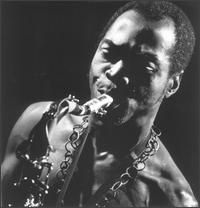
Six Degrees of MyPod
Fela Kuti collaborated on the 1980 album Music Of Many Colors with Roy Ayers, who has a song on the 70’s Funky Soul Pod.
Bernie Worrell played on two of the three tracks on Fela Kuti’s 1985 album Army Arrangement. Bernie also played with the Talking Heads, including their set at the Heatwave Festival, which is featured on the Talking Heads Live 1980 Pod. That concert was the first with the extended Talking Heads lineup which was the result of Fela Kuti’s influence on the Talking Heads and their producer Brian Eno
Fela Kuti frequently mentioned James Brown (who is on the 70's Funky Soul Pod) as a major influence on his music.
Monday, January 08, 2007
Talking Heads live 1980
Heatwave was a rock festival August 23, 1980, outside of Toronto,
Canada at Mosport Park, Bowmanville, Ontario. The slogans used
to promote the show were variously the "Punk Woodstock", the
"New Wave Woodstock", or "The 1980s Big Beat Rock and Roll Party".
The band that toured for the Remain in Light album, including
Adrian Belew, performed for the first time at Heatwave as the
sun was setting. Their segment began with the four original
members and then as the songs progressed, they added musicians
and vocalists, including Nona Hendryx (vocals), Busta Jones,
Steve Scales, Dolette McDonald, and Bernie Worrell (keyboards).

When David Byrne ran offstage after Talking Heads’
appearance at the Heatwave Festival near Toronto,
he was ecstatic; the group’s first performance as
an enlarged, funk-oriented band was an overwhelming
success--from the point of view of both the audience
and the musicians. Though that appearance--and a
subsequent Talking Heads concert in New York’s Central
Park--was originally intended as a sort of limited
special event, the group is now trying to put together
a major tour in support of its new album, Remain In
Light, which is due from Sire Records on October 8th.
"As far as I’m concerned, this is the only way I’d
want to do it," Byrne said of the band’s revamped
sound and lineup (the original four musicians plus
several guest artists). "It represents a complete
about-face. I’ve really marveled that a group can
do that."
According to Byrne, the "about-face" is a result
of the interest that he and producer Brian Eno
share in African music and rhythms. "We wanted to
develop an understanding of the African musical
concept of interlocking, interdependent parts and
rhythms that combine to make a coherent whole,"
Byrne explained. "It’s completely different from
playing rock songs; it’s not just a band executing
a tune." - James Henke, Rolling Stone, 10/16/80
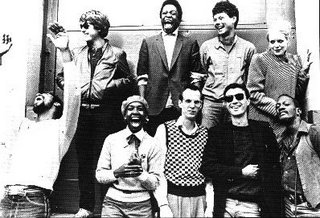
The new material - and the Nigerian music that played over the PA
before their set - showed that the Heads have been listening to
both American and African funk. Like "I Zimbra," David Byrne's
latest compositions stay on one chord for long stretches but are
broken up by all sorts of percussive interplay. The extended band
was designed to show clashes in every register. Tina Weymouth's
stolid bar line versus Jones' syncopated thunks; Belew's sustained,
weightless leads versus Byrne's choppy chording and Worrell's
chattering clavinet; Byrne's reedy voice versus his gospel-toned
backups. Most of the new songs also used interlocking vocal lines,
with short interjections punctuating long, chantlike phrases. The
many layers of cross-rhythm kept the songs from sounding like
disco, and while there was jamming galore, the tunes weren't
stretched.
- review by Jon Pareles, published in Rolling Stone 10/30/1980
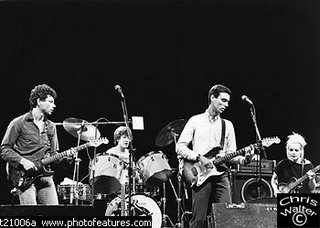
Musicians:
David Byrne
Chris Frantz
Jerry Harrison
Tina Weymouth
Adrian Belew
Dolette MacDonald
Busta Jones
Bernie Worrell
Steve Scales
Songs:
Psycho Killer
Warning Sign
Stay Hungry
Cities
I Zimbra
Once in a Lifetime
Houses in Motion
Born Under Punches
Crosseyed and Painless
I’m missing:
Life During Wartime
Take Me to the River
***there are some pretty bad backup vocals.
It pretty much ruins "Once In a Lifetime" as serious music...
but it rocks if you want to laugh****
Check out some 1980 live video from Rome Italy
& Minneapolis, Minnesota over @ my SLC Library Boy blog
70's Funky Soul

Here are a few random tracks picked for no particular reason besides the fact they are funky!
More to come...

Track List:
Roy Ayers – Running Away (12”)
Roy Ayers – Freaky Deaky
T-Connection – Groove to Get Down
Herbie Hancock – Hang Up Your Hang Ups
James Brown – I Got Ants In My Pants
James Brown - Funky Good Time - More Peas (with Fred Wesley)
Fred Wesley – House Party
Juice Catch a Groove
Jimmy Castor Bunch – King Kong
Jimmy Castor Bunch – Space Age
Salsoul Orchestra - Getaway
Notations - Superpeople
The Soul Searchers – Blow Your Whistle
The Soul Searchers – Ashely’s Roachclip
Tina Turner – Stuffs and Things
George McCrae – I Get Lifted
Kool & the Gang – Funky Man - live 1971
Kool & the Gang – Music In the Message
Idris Muhammed – Crab Apple
Slave - Slide
The Nite-Liters – Afro Strut
Johnny Pate – You Can’t Even Walk in the Park
Incredible Bongo Band - Bongolia
Village Callers - Hector
Dexter Manzel – Space Funk
Cymande - Bra
The Funky Meters – People Say
The Meters – Get Out of My Life Women
The Meters – Pass the Peas
Juice – Catch a Groove
Tony Allen – Home Cooking



